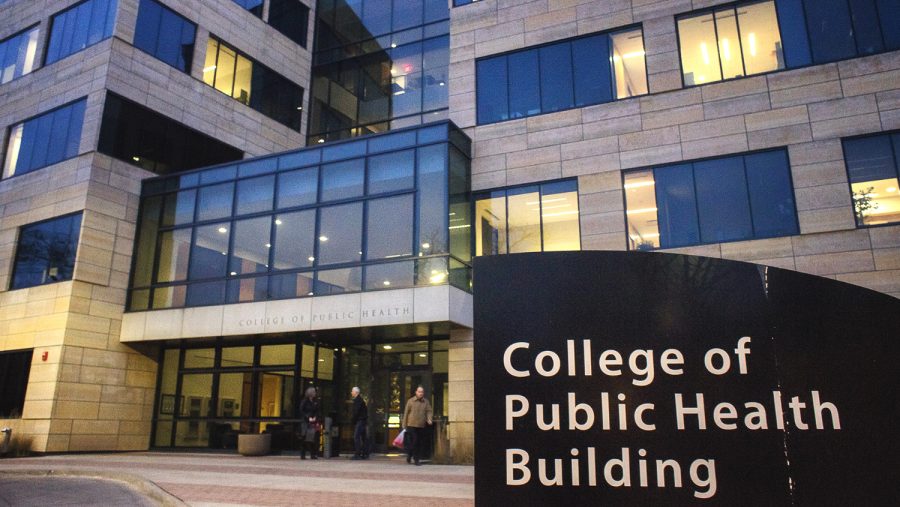As HPV vaccinations show slow growth across Iowa among teens, UI students promote their benefit
Vaccinations for the Human Papillomavirus (HPV) have not seen the same levels of growth among other vaccinations recommended for teens in Iowa. The HPV vaccination was approved in 2006 and has proven to help prevent genital warts and cancers among men and women.
The College of Public Health Building as seen on Thursday, Dec. 14, 2017.
September 5, 2019
Vaccinations for HPV have not reached an optimal level among Iowa teens compared with other vaccinations, according to the Iowa Department of Public Health, though University of Iowa students report higher rates of receiving vaccinations.
HPV is an infection most commonly transmitted sexually and can lead to a number of health complications, including genital warts and cancer in both men and women. The Food and Drug Administration approved the HPV vaccination Gardasil in 2006, according to the agency.
The vaccine includes a series of shots depending on an individual’s age, said Natoshia Askelson of the UI’s Cancer Prevention and Control Research Network Collaborating Center.
According to the Iowa Department of Public Health, 55.1 percent of Iowa teenagers completed HPV vaccination shots in 2018. In comparison, 94 percent were vaccinated for Tdap and 83.6 percent for meningitis.
More UI students report having ever received an HPV vaccination than the state’s teenage population. According to the 2019 National College Health Assessment survey, 62.1 percent of students have received an HPV vaccination — up from 35.5 percent in 2009.
Askelson said she and her colleagues seek funding in order to implement cancer preventative treatments that have shown to be effective — one of which is the HPV vaccination.
“There are more and more oral cancers that we are seeing in young people,” she said. “And there’s a chance of developing those cancers.”
Askelson said that even with the availability of vaccinations, parents of teenagers in Iowa are less likely to have their children vaccinated to prevent HPV, along with their other vaccinations, because of a lack of recommendations by health-care providers.
RELATED: Vaccine exemptions on the rise in Iowa
As a result, Askelson said conversations between nurses and parents are increasingly important.
“As opposed to a strong recommendation, they’re giving it as an option instead of telling parents these are the things your kids need,” she said.
UI junior Kayla Felderman, who received HPV vaccinations in the past, said she is surprised at the slow progress of the vaccination statewide. She said she doesn’t see any harmful effects of receiving the vaccine and therefore doesn’t understand why some parents choose to not vaccinate their children.
“Cancer is really prevalent in our society, so I would see no reason not to get the HPV vaccination,” Felderman said. “And I know I would never not get a vaccine if I thought it was helpful.”
RELATED: Cappel: Why the government shouldn’t shouldn’t require vaccines
UI sophomore Helena Fantz has also been vaccinated. She said that she was also surprised by these findings, especially because she said she believes vaccines are “extremely” important.
“I really only see positives to getting it done,” Fantz said.
There are also UI students who acknowledge the importance of these vaccinations but are unsure whether they are vaccinated.
UI sophomore Katie Kohut said she was not sure if she has received the vaccination, but she still thinks it would be best to get vaccinated from a preventative standpoint.
With the slow growth in the number of HPV vaccines, Askelson said, it is most important that people understand the effectiveness of the vaccination to improve the number of teenagers vaccinated across Iowa.
“We know it really works,” she said. “If you have a chance to prevent cancer and your kid having some horrible cancer outcome in the future, then it is something you should do.”






